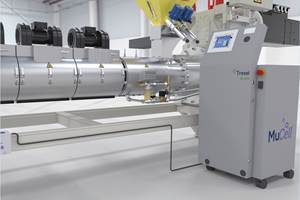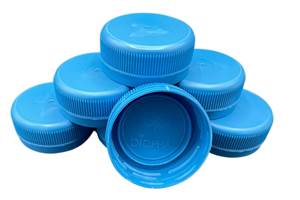DS Smith and Aquapak Target Single-Use Plastic Packaging Reduction with Biodegradable Alternative
Scientific collaboration between DS Smith and Aquapak Polymers aimed at commercializing groundbreaking sustainable single-use packaging solutions.
A scientific collaboration between Atlanta-based , a leading sustainable packaging company, and U.K. developer of innovative biodegradable polymers is expected to result in the development of next-generation single-use packaging solutions-- a fully recyclable packaging alternative to non-recyclable plastics.
Now that they have completed the pilot project stage, the partners are working on practical applications of the combined, biodegradable materials with a focus on recyclability and performance. This includes a range of packaging solutions where traditional plastic films can be replaced with Aquapak’s Hydropol, a biodegradable and water-soluble polymer that will help improve the recycling process and result in less contamination, as it is designed to dissolve completely in warm or hot water.

Company sources tell PT that Aquapak’s Hydropol is based on polyvinyl alcohol (PVOH). “Through 10 years of R&D, Aquapak has achieved a method of thermally processing PVOH allowing the production of pellets—the standard form for secondary processing in the plastics industry. Aquapak’s materials, based on PVOH are inherently biodegradable. Given the right balance of environment and microbial presence, they will biodegrade to carbon dioxide, water and mineralized natural biomass,” says one source.
The partnership has the potential to transform the sustainable packaging market with applications across a variety of industries. Working closely with customers to replace the use of traditional plastics in packaging delivers real solutions to the world’s single-use plastic pollution crisis and supports recycling efforts for both consumers and recyclers.
Said DS Smith’s materials development director Nick Thompson, “Aquapak’s technological advances in novel barrier chemistries combined with our broad range of packaging applications will help us work together to solve many of the most pressing packaging recyclability issues. The impact will be immediate, and our aims are aligned in bringing a circular solution to recyclable packaging products.”
Added Aquapak’s CEO Mark Lapping, “Our organizations are committed to eliminating plastic pollution at the source and by working together, we can help speed up the roll out of recyclable, biodegradable packaging that is designed for the circular economy.”
DS Smith’s exclusive partnership with Aquapak will support the company’s long-term sustainability targets, including the manufacture of 100% reusable or recyclable packaging by 2025. With a focus on tackling hard to recycle items, the adoption of this biodegradable technology will allow for less contamination in both the recycling and paper-making process.
According to Aquapak’s website, Hydropol is showing itself as being made into a highly effective yet water-soluble laundry bag. Currently used water soluble bags generally lack strength and barrier against spread of infection, and can leave damaging residues in domestic washing machines. Aquapak Infection Control Laundy Bags are particularly well suited for front-line use in hospitals and nursing and rehabilitation facilities, and in specialty areas such as saving contaminated linen for incineration. These bags can be used to transport first responders/care staff clothing, without risk of viral contamination from the front-line to a domestic washing machine, where they dissolve completely in a domestic wash cycle. These bags can be purchased from a number of manufacturers across the world and from Aquapak’s U.K. manufacturing partner.
Aquapak has sales representatives based in the U.S., as well as distribution partners covering all of the U.S. and Canada.
Related Content
BMW Group Vehicle to Adopt 3D Printed Center Console
A vehicle coming to market in 2027 will include a center console carrier manufactured through polymer robot-based large-format additive manufacturing (LFAM).
Read MoreImpacts of Auto’s Switch to Sustainability
Of all the trends you can see at NPE2024, this one is BIG. Not only is the auto industry transitioning to electrification but there are concerted efforts to modify the materials used, especially polymers, for interior applications.
Read MoreFoam-Core Multilayer Blow Molding: How It’s Done
Learn here how to take advantage of new lightweighting and recycle utilization opportunities in consumer packaging, thanks to a collaboration of leaders in microcellular foaming and multilayer head design.
Read MorePHA Compound Molded into “World’s First” Biodegradable Bottle Closures
Beyond Plastic and partners have created a certified biodegradable PHA compound that can be injection molded into 38-mm closures in a sub 6-second cycle from a multicavity hot runner tool.
Read MoreRead Next
Making the Circular Economy a Reality
Driven by brand owner demands and new worldwide legislation, the entire supply chain is working toward the shift to circularity, with some evidence the circular economy has already begun.
Read MoreBeyond Prototypes: 8 Ways the Plastics Industry Is Using 3D Printing
Plastics processors are finding applications for 3D printing around the plant and across the supply chain. Here are 8 examples to look for at NPE2024.
Read More












